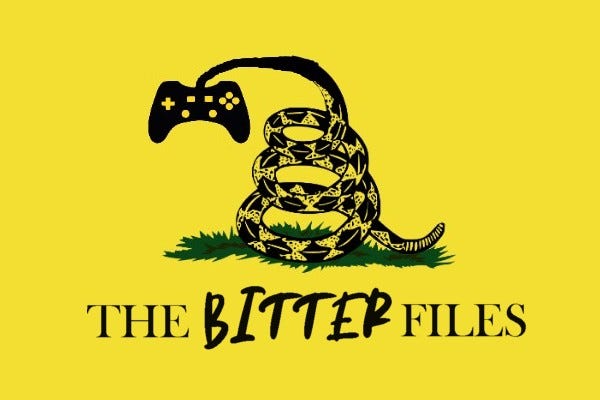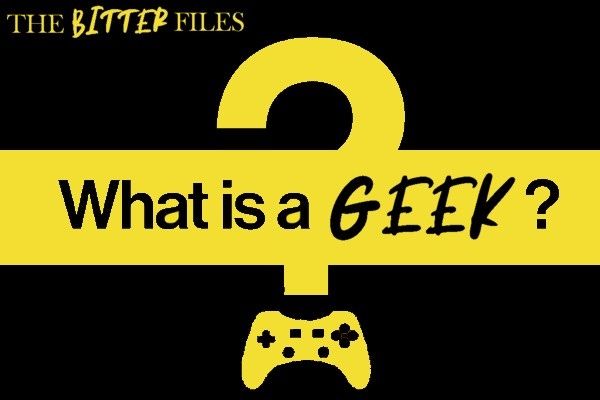What Is a Geek?
The Bitter Files episode 1: Geek culture, its politics, and the rise of the so-called "Social Justice Warrior"
This is the first episode of a monthly feature for paid subscribers titled The Bitter Files - excerpts from a book I wrote but never finished.
Read here for more information
👉Episode 1 - What Is a Geek?
Episode 2 - The Masculine Medicine Show
Episode 3 - The Red Pill
Episode 4 - Reactionaries and Apostates
This is a story about geeks.
Given that, it’s probably a good idea to start by defining the word “geek.” Generally, it’s probably tempting to read it as an insult. A “geek” was never supposed to be a fun thing to be called. It’s said that the word came from the German “geck,” meaning a fool or a freak, and in modern usage, it means something close to the word “nerd.”
“Geek” and “nerd” aren’t really synonymous, though there’s undoubtedly a considerable overlap. Scientist and software engineer Burr Settles actually tried to live up to his name and “settle” the argument in 2013 when he collected a whole lot of data from Twitter and used word association stats to figure out the differences in the ways the two words are used. He admits that it’s not his best science, but I think it’s good enough for us. The conclusion he came up with is that a nerd is:1
A studious intellectual, although again of a particular topic or field. Nerds are “achievement” oriented, and focus their efforts on acquiring knowledge and skill over trivia and memorabilia.
While a geek is:
An enthusiast of a particular topic or field. Geeks are “collection” oriented, gathering facts and mementos related to their subject of interest. They are obsessed with the newest, coolest, trendiest things that their subject has to offer.
In short, a geek is someone who obsesses over pop culture. Whether that means Star Trek, Spider-Man comics, Buffy, or Elon Musk. It’s a very wide umbrella.
The thing is that we live in an inescapably consumerist society. Pop culture is ubiquitous, or else it wouldn’t be pop. Western society pressures us to become geeks, so the idea of “geek” being used as an insult is kind of paradoxical. True to that, the term is becoming less pejorative all the time.
More than ever in western society, geeks are running the show. Necessarily, with the reinvention of the geek from an outlier to a cultural norm, geeks have come to group together and celebrate their common interest.
So this is also a story about geek culture.
Popular media tends to lag behind reality when it comes to the portrayal of geeks and nerds. Academic study into fandom culture didn’t really kick off until the 1990s2, which is a slow start, considering Trekkies (or Trekkers, as many evidently prefer to be called) had been a thing for around two decades. To this day, the stereotype of the geek and nerd, to the extent that they’re considered interchangeable in the media3, remains pretty narrow and specific: Ordinarily, that means a lack of fashion sense, low social skills, bad hygiene, overwhelmingly male, and overwhelmingly white or Asian.
The racial aspect of geekdom in media and culture is especially notable – almost all geeks and nerds are white, while at the same time, black people are almost never geeks or nerds, while Jews and Asians are practically geeks or nerds by default. Maybe the standout exceptions are Steve Urkel from Family Matters, Abed from Community, and Raj from The Big Bang Theory (though lampshading the fact that Raj is Indian constitutes, like, 90% of his character.)
According to Lori Kendall, the perception of the geek/nerd stereotype probably began to change from generally negative to generally positive in the 1980s when workplaces started adopting computers on a more widespread basis.4 The negative stereotype of the geek/nerd had always been hammered hard in pop culture, particularly in 80s college sex comedies like Porky’s, Animal House, Screwballs, Spring Break, Fast Times at Ridgemont High, Ferris Bueller’s Day Off, and anything else John Hughes’ name was attached to. But things began to turn around with 1984’s Revenge of the Nerds.
Rather than cast the reckless and hard-drinking party animals as the stars like most college comedies, it was the nerds who were the heroes, fighting the meaty, dumb, villainous jocks. It was one of the first movies to paint nerds as, not just oppressed, but undeservedly so.
Of course, Revenge of the Nerds didn’t really work to break the nerd stereotype. It heavily reinforced it. The only thing it tried to change was the idea that this stereotypical identity was a bad thing. Much later, The Big Bang Theory attempted to do kind of the same thing. On one hand, the humanization and celebration of nerds and geeks in popular culture – you know, recognizing them as actual people deserving of respect – is kind of a laudable change of pace for pop culture, but on the other hand, there’s still a refusal to give up on the stereotype. On the internet, the term “nerd blackface” is commonly thrown around in reference to The Big Bang Theory.5
Amidst the media’s often inaccurate, often misguided, but nevertheless often well-meaning attempts to figure out what geekdom is actually about, geeks have made a pretty good attempt at forming their own collective identity to counter the one most commonly presented. As Gray, Sandvoss, and Harrington describe it, “a collective strategy, a communal effort to form interpretive communities that in their subcultural cohesion evaded the preferred and intended meanings of the ‘power bloc’ represented by popular media.”[2]
In what was one of the celebrated landmark moments for geek culture, the December 22, 1986 edition of Newsweek ran a cover story about a Star Trek convention. While it clearly aimed to be endearing, the article did little better than to trot out the same surface level observations we always hear about Star Trek fans – that they walk around wearing pointy plastic Vulcan ears, that they memorize the minutiae of trivia to the point where they know the combination of Kirk’s safe, that they have an ongoing rivalry with Star Wars fans (“The Star Wars people want toys. The Trek people want information,” so says one interviewee). At one point, the writer interviews a guy who had a Star Trek themed wedding. And all the while they throw out “theories” about what it is about the show that makes people this way, one of which, apparently favoured by William Shatner, is “Some of these people are insane.”6
Psychologists have recently discovered that the terms “geek” and “nerd” are losing their negative stigma among the youth.7 And why wouldn’t they? We’re living in an age when the people who used to get their underpants pulled over their head in the 70s and 80s are now in the drivers’ seat of modern society. Those people became Bill Gates and Steve Jobs. They became J. J. Abrams and Joss Whedon. They became Elon Musk. Elon Musk! Science journalist Mark Henderson, in his book The Geek Manifesto, says:
There has never been a better time to be a geek. Poorly served by the mainstream media and entertainment, we are demanding, and getting, more and more attention – in popular culture if not yet in politics. Proper geeks are becoming proper celebrities, with an impact and reach that stretches well beyond their core audiences. Whisper it, but being a geek is becoming cool.8
Even Henderson seems to be coming in late to the game, here. Being a geek is already cool. According to Nash Information Services, the list of the 20 most profitable movies (based on absolute profit on worldwide gross) includes four Harry Potter movies, two Twilight movies, two Avengers movies, a Batman movie, a Star Wars movie, and Transformers.9 (Editorial note: This information comes from the year of writing in 2016) Major fashion retailer Topshop has been selling shirts printed with the word “GEEK” plastered in giant capital letters across the front since 2013.
According to comic writer Warren Ellis, best known for the comic Transmetropolitan:
People will call Buffy the Vampire Slayer geek culture and yet it ran for seven years and is one of the most successful TV shows of all time. You could argue that superhero and fantasy movies are modern cinema. Geek hasn't beaten the mainstream, it's the new iteration of the mainstream. You don't have to buy a fanzine on mail order to be part of it any more. You can be part of a digital community that draws you together and keeps building your interest.10
Since 2013, the YouTube channel with the most subscribers has been that of Felix Kjellberg, username PewDiePie, who counts his fans in greater numbers than Katy Perry, Taylor Swift, One Direction, Justin Bieber, and even YouTube’s own official account. Kjellberg’s whole thing is mostly filming himself playing video games while he talks over the top of them. Over 54 million people worldwide tune in to it every day, and each video gets close to double the number of views of any episode of television out there, and he does it with a webcam and a PC. We’ll still hear all about how this geek stuff is some kind of niche entertainment enjoyed by a small number of bespectacled shut-ins, when, in actual fact, if we run it by pure numbers, we’re lucky that the free market doesn’t outright replace the whole medium of television with a 24-hour stream of guys playing video games live.
Clearly, there’s some kind of cultural lag happening in which a lot of people still want to read “geek” or “nerd” as some kind of insult in the same way as Ogre meant it in Revenge of the Nerds when he screamed “NEEEERRRRRDS!” in abject rage from a balcony. As recently as 2014, the billionaire financier David Harding, after donating £5 million to the Science Museum in London, told a reporter for The Times “I feel these words are as insulting as n——-,” and that scientists had been “lured into” using words like these to refer to themselves. He also went on to throw out words like “yid” and “wop” as other insults from the 20th Century that are apparently comparable to “geek.”11
To be charitable, for a white billionaire in his late 50s, it’s nice just to hear him suggest that racial slurs are a bad thing at all. And though comparing a high school insult to a slur used as part of an institutionalised effort to brutally subjugate and literally enslave a race of people is, you know, a stretch, it’s nice for an old guy to come out openly in defense of kids who like to learn stuff.
After the jump: Linguistic reappropriation, geek culture’s clash with feminism, and the term “Social Justice Warrior” emerges. Upgrade to a paid subscription to read the rest of this and all the other episodes of The Bitter Files.
Keep reading with a 7-day free trial
Subscribe to Plato Was a Dick to keep reading this post and get 7 days of free access to the full post archives.






